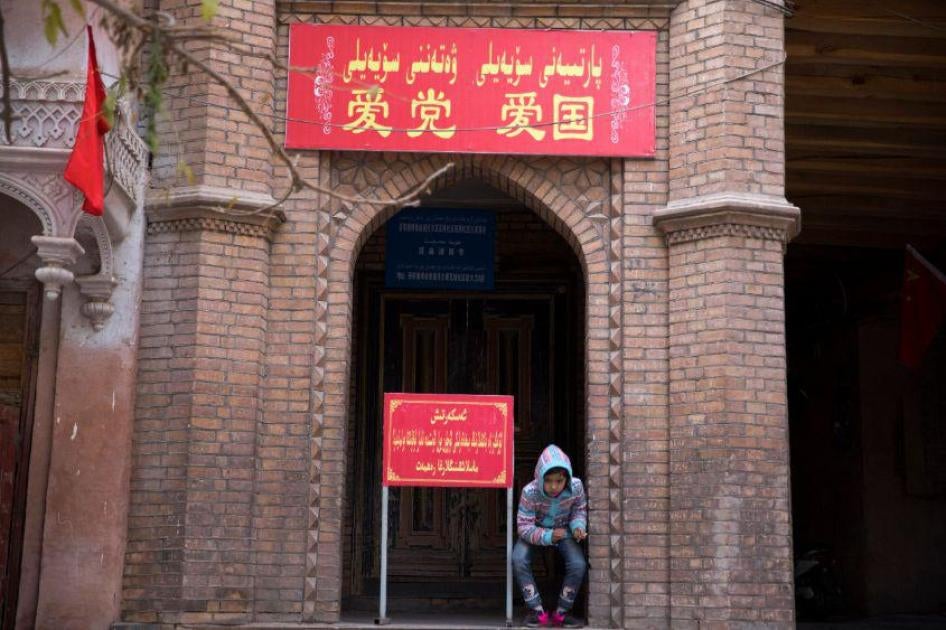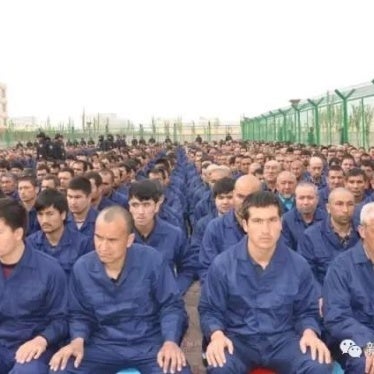Imagine a country where practicing Islam is treated as a crime. Where using the everyday greeting of “As-salaam alaikum” is punished. A place so repressive that even listening to a religious sermon at a mosque or reciting a funeral prayer from the Quran in your home can land you in jail. A place where crescents are removed from burial sites, Qurans and prayer mats are confiscated, and mosques are destroyed. A country that bans parents and teachers from introducing religion to children, even at home.
It’s hard to imagine that a place like this — with such pervasive, abusive restrictions on religion and identity — exists in the 21st century. But this is Xinjiang, a region of northwest China, under the rule of President Xi Jinping. The Organization of Islamic Cooperation (OIC) should use the full weight of its mandate to condemn this outrageous abuse.
Chinese authorities have effectively outlawed the practice of Islam in this region. In Xinjiang, a population of 13 million ethnic Uyghurs and other Turkic Muslims are subjected to forced political indoctrination, collective punishment, restrictions on movement and communications, heightened religious restrictions, and mass surveillance. Last year, Human Rights Watch and other independent organizations reported on the Chinese government’s mass arbitrary detention, torture, and mistreatment of an estimated one million Turkic Muslims in this region.
They have committed no crime but are being held in “political education” camps, where they are forced to learn Mandarin Chinese and sing praises of President Xi and the Chinese Communist Party. There have been reports of deaths in the camps, raising concerns about physical and psychological abuse, as well as stress from poor conditions, overcrowding, and indefinite detention.
How the OIC chooses to respond to the Chinese government’s treatment of Muslims will prove to be a defining moment for the 57-member state body. The OIC needs to take strong and decisive steps against China’s repressive campaign, or it will be sending a dangerous signal to other countries on how they can treat their Muslim minorities.
The Chinese government has sought to justify its repressive policies and practices, saying they are necessary to eliminate what it considers to be “terrorism” and “extremism” in the region. But what has become evident is that for the Chinese government, any expression of Muslim identity is synonymous with extremism. Why else would 22 of the 26 countries that China considers “sensitive” be Muslim-majority countries that are OIC members.
The Xinjiang authorities have made foreign ties to these countries -- which include Saudi Arabia, the United Arab Emirates, Turkey, Pakistan, Egypt, and Algeria -- a punishable offense. Turkic Muslims who have been to these countries, have families, or otherwise communicate with people there, have been interrogated, detained, and even tried and imprisoned. OIC governments should view these actions as a direct affront to them that should result, at the very least, in a sharp diplomatic response to Beijing.
China’s campaign of repression in Xinjiang is a key test of whether the OIC and other concerned governments will sanction an increasingly powerful China to press it to end its systemic abuses. Turkey has recently spoken out, strongly condemning the Chinese government’s treatment of Muslims in Xinjiang as “a great shame for humanity.” Civil society groups, members of parliament, and others in OIC countries ranging from Indonesia to Kuwait have publicly protested China’s treatment of Muslims.
The OIC as a block should follow suit and publicly denounce China’s policies at its upcoming foreign ministers’ summit in Abu Dhabi. At this meeting, the OIC has an opportunity to call on China to cease its campaign of repression in Xinjiang and immediately close all political education camps.
Given the scale and gravity of abuses that await Turkic Muslims in China, OIC members should pledge that they will not forcibly return any refugees and asylum seekers to China. It is also crucial for the OIC to support a resolution at the upcoming session of the United Nations Human Rights Council in Geneva to establish an independent, international fact-finding mission to investigate abuses in Xinjiang.
It is glaringly evident that a country as globally influential as China sees no significant political cost to its abusive campaign against Muslims. The OIC has the power, mandate, and responsibility to change this equation.










